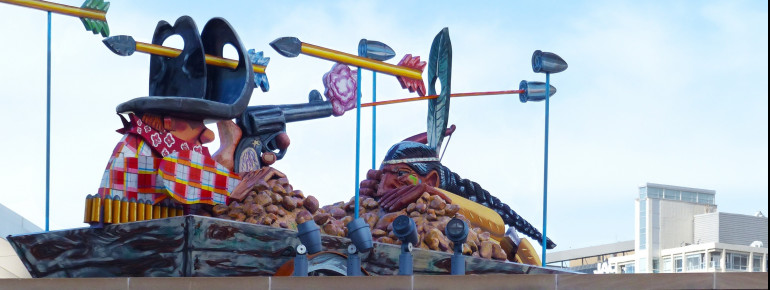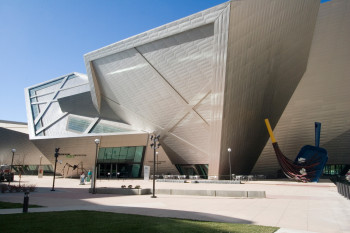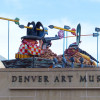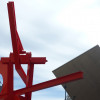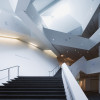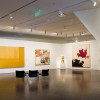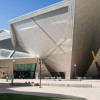Contents
Description
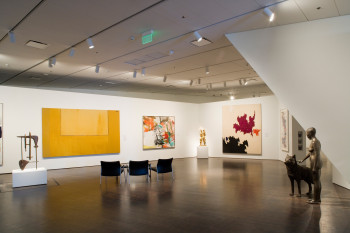
The Denver Art Museum is one of the biggest and most significant art museums located between Chicago and the west coast: the collection includes more than 70.000 art works. The museum is especially known for its collection of Indian, pre-Columbian and Spanish colonial artworks. It extends from the Hamilton over to the North Building. The two are connected on the first floor. For you to explore there are ten permanent and some additional temporary exhibitions. You can start your visit either in the Hamilton, or in the North Building.
Exhibitions in the North Building
The first and second floor of the North Building are devoted to the natives of America, with an internationally renowned collection. What stands out is the diversity of this culture. From the historical ceramics of the Pueblo Indians, clothing made of pearls and more recent works made from glass, you get to see art works from many different centuries, various tribes and manifold working methods. On the first floor you will also find a design exhibition, which shows modern and contemporary furniture, architectural and industrial design. When you reach the third floor, you can look forward to art from Meso, Central and South America, which stem from the time before Columbus and the Spanish colonial time. Artists used different materials such as ceramics, stone, textiles or gold for the creation of their works.
The fourth floor will take you far back in art history with Asian art works. Exhibited are artifacts from 4.000 before Christ until today, from countries like China, Japan, India, Tibet and Korea. One floor up you will find French paintings from the 19th century as well as important Renaissance artists and old masters. What is more, design objects such as furniture and decorative arts as well as textiles from all over the world are exhibited here – from ancient times until today. The photographs you find on the sixth floor are primarily western American, 19th century works. Savor the photographs of Timothy O’Sullivan, Diane Arbus or Edward Weston.
Round tour through the Hamilton Building
The ground and the first floor of the Hamilton Building await you with changing exhibitions. Art from the American West and the Rocky Mountains is brought to you in the exhibition on the first floor. The second floor shows “Oceanic Art”. This includes in particular wood carvings and painted cattle textiles from Samoa, Tonga and Hawaii, which emerged at the end of the 18th and the beginning of the 19th century. Another exhibition that stretches over two levels is devoted to modern art. Works by Pablo Picasso, Marcel Duchamp or Georgia O'Keefe can be admired here. Furthermore, the top floor shows around 1.000 works of art from Africa. The collection impresses with a variety of sculptures, jewelery, drawings, textiles and paintings, made from wood, metal or terracotta. The focus lies on West Africa, but other regions are also exhibited.
Historical Information
The beginnings of the museum were in the year 1893, when the Denver Artists's Club was founded. Until 1949, their collection was shown in changing places, in libraries, private houses or in the Denver City and County Building. After this, the museum received its own building on the 14th Avenue Parkway. Since 1971, the collection is housed in the North Building, which, with its 24 sides, seven floors and over one million glass tiles on its facade, is one of the most architecturally interesting buildings in Denver. This iconic construction by Gio Ponti was complemented by another highlight of architecture in the new millennium: the Frederic C. Hamilton Building. This building emerged under the lead of architect Daniel Libeskind, and is reminiscent of the peaks of the Rocky Mountains and the crystals found in that area. With the new rooms added in October 2006, the museum could almost double its exhibition space.
Interesting facts
- The day pass at Denver Art Museum is $22 making it one of the 15 cheapest tourist Attractions in the USA.
How to get there
By car
The museum is located in downtown Denver on 13th Avenue. To get to the city, take highway number 40, or respectively 287, and at the Civic Center Park turn southwards. Depending on which direction you are coming from, choose either Broadway or Bannock road. The best place to park your car is in the garage of the Cultural Center Complex at the corner of 12th Avenue and Broadway.
By public transport
The closest bus stops are Bannock St & W 13th Ave and W 13th Ave & Broadway. A number of buses stop here. Should you take the free 16th Street Mall Shuttle, get off at Cleveland Place and you will reach the museum over the Civic Center Park.

